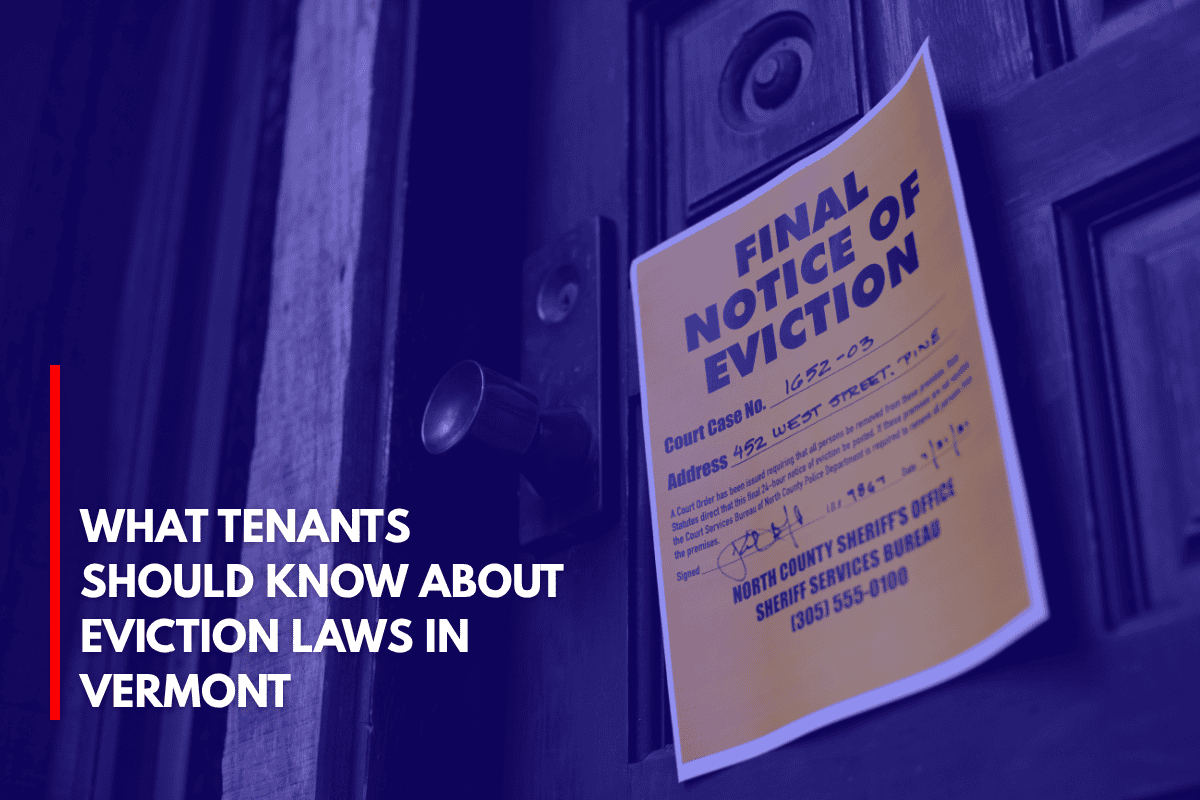Vermont tenants should understand that eviction laws in the state are designed to protect both their rights and the interests of landlords, but the process must be followed carefully and legally by all parties. Here’s what tenants in Vermont need to know about eviction laws:
Grounds for Eviction
Landlords in Vermont can evict tenants for several reasons, including:
Non-payment of rent
Violation of lease terms (such as unauthorized occupants, property damage, or other breaches)
Illegal activities conducted on the rental property
Expiration of lease or termination of a month-to-month tenancy
Notice Requirements
The type and length of notice depend on the reason for eviction:
Non-payment of rent: Landlords must give a 14-day notice to pay or quit. If the tenant pays the overdue rent within this period, the eviction process stops.
Lease violations: Landlords typically provide a 30-day notice to quit, which gives tenants time to remedy the violation or move out.
Illegal activities or severe threats to health/safety: Landlords may issue an unconditional 14-day notice to quit, and the tenant is not given an opportunity to cure the violation.
End of lease or no-cause termination: For month-to-month tenancies, a 30-day or 60-day notice is generally required (depending on the duration of tenancy).
The Eviction Process
The process is strictly regulated and must be followed step-by-step:
Landlord serves a written notice: The notice must clearly state the reason for eviction and the time the tenant has to respond or vacate.
Notice period expires: If the tenant does not remedy the issue or move out, the landlord can file an eviction lawsuit (ejectment action) in court.
Court summons and complaint: The tenant is served with court papers and has 21 days to respond.
Court hearing: Both parties attend a hearing where the landlord must prove the legal grounds for eviction, and the tenant can present a defense.
Judgment and writ of possession: If the court rules in favor of the landlord, a writ of possession is issued, and the tenant typically has 14 days to move out (5 days in some cases, such as illegal subleasing or missed rent escrow payments).
Enforcement: Only law enforcement can physically remove a tenant or their belongings from the property.
Tenant Protections
No self-help evictions: Landlords cannot remove tenants, change locks, or shut off utilities without a court order.
Right to a court hearing: Tenants have the right to a fair hearing before any eviction is enforced.
Retaliation protections: Vermont law prohibits landlords from retaliating against tenants for exercising their legal rights.
Documentation: Tenants should keep records of all rent payments, communications, and notices received.
Additional Notes
Oral vs. written agreements: Written leases offer more security, but oral agreements are also recognized under Vermont law.
Defenses: Tenants can raise defenses in court, such as improper notice, retaliation, or failure by the landlord to maintain the property.
Duration: The eviction process can take anywhere from a few weeks to several months, depending on the situation and whether the tenant contests the eviction.
Legal help: Tenants facing eviction are encouraged to seek legal advice or contact Vermont’s Access and Resource Center for assistance.
Summary Table
| Eviction Reason | Notice Required | Time to Cure/Move Out |
|---|---|---|
| Non-payment of rent | 14-day notice | 14 days to pay or vacate |
| Lease violation | 30-day notice | 30 days to cure or vacate |
| Illegal activity | 14-day notice (no cure) | 14 days to vacate |
| End of lease/no cause | 30- or 60-day notice | 30–60 days to vacate |
Vermont’s eviction laws provide clear protections for tenants, but it’s important to respond promptly to notices and seek legal help if needed. Landlords must follow strict legal procedures, and tenants have the right to defend themselves in court.
Sources:
- https://www.hemlane.com/resources/vermont-eviction-laws/
- https://innago.com/vermont-eviction-process/
- https://upsolve.org/vt/tenants-rights/
- https://www.steadily.com/blog/eviction-process-in-vermont











Leave a Reply